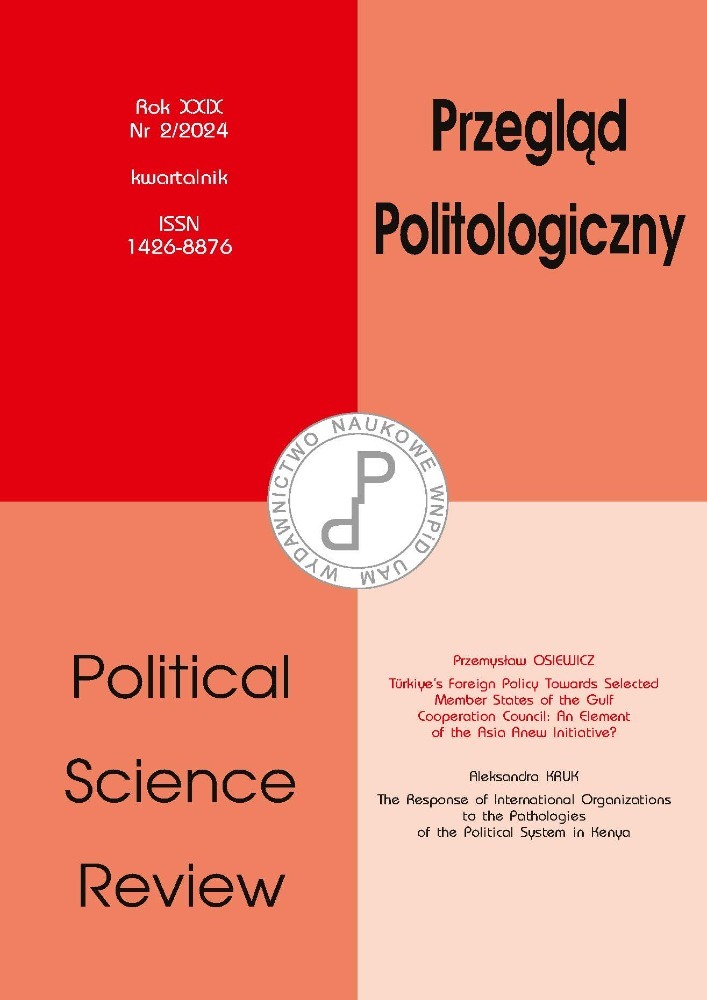Abstract
The aim of the article is to examine the causes and consequences of changes in Türkiye‘s foreign policy towards the most influential member states of the Gulf Cooperation Council, namely Saudi Arabia, Qatar, and the United Arab Emirates. The main research hypothesis assumes that the change in Türkiye‘s policy towards the GCC after 2021 is probably of a pragmatic nature and is intended to obtain financial resources. As such, it constitutes only an element of Türkiye‘s Asia Anew Initiative, namely the new approach in relations with various Asian partners. At the same time, it is not an element of Türkiye‘s political, long-term strategy towards the Middle East region. The work includes the author’s definition of a pragmatic approach to the state’s foreign policy.
References
Asia Anew Initiative (2023), Ministry of Foreign Affairs of Türkiye, https://www.mfa.gov.tr/asia-anew-initiative.en.mfa, 17.11.2023.
Bakir A. (2023), Turkey’s security role in the Gulf region: exploring the case of a newcomer, “Turkish Studies”, vol. 24, no. 5. DOI: https://doi.org/10.1080/14683849.2023.2182686
Cochran M. (2012), Pragmatism and International Relations: A Story of Closure and Opening, “European Journal of Pragmatism and Amercian Philosophy”, vol. 4, no. 1. DOI: https://doi.org/10.4000/ejpap.777
Creswell J. W. (2009), Research Design: Qualitative, Quantitative, and Mixed Methods Approaches, Thousand Oaks–London.
Davutoğlu A., Interview with Turkey’s Foreign Minister Ahmet Davutoğlu: “Turkey Creates Balance in the Middle East”, 21.04.2010, Qantara.de, https://qantara.de/en/article/interview-turkeys-foreign-minister-ahmet-davuto%C4%9Flu-turkey-creates-balance-middle-east, 13.11.2023.
Davutoğlu A. (2012), Stratejik Derinlik. Türkiye’nin Uluslararası Konumu, Küre Yayınları, Istanbul.
Erdoğan meets Qatari emir in Doha: In a joint statement, the two countries marked 50 years of diplomatic relationships (2023), https://bianet.org/haber/erdogan-meets-qatari-emir-in-doha-281699, 20.11.2023.
Fuller G. E. (2014), Turkey and the Arab Spring: Leadership in the Middle East, Bozorg Press.
Göksel O. (2015), The Impact of the Arab Spring on Turkey’s Role and Relations in the Middle East, in: Turkish Foreign policy in the New Millenium, eds. H. Işıksal, O. Örmeci, Peter Lang, Frankfurt am Main.
Günay D. (2017), The Roles Turkey Played in the Middle East (2002–2016), in: Turkish Foreign Policy: International Relations, Legality and Global Reach, ed. P. Gözen Ercan, Palgrave Macmillan, Cham. DOI: https://doi.org/10.1007/978-3-319-50451-3_10
Karataş I. (2023), Erdogan in the Gulf: Strengthening Economic Ties and Navigating Regional Politics, Gulf International Forum, https://gulfif.org/erdogan-in-the-gulf-strengthening-economic-ties-and-navigating-regional-politics/, 21.11.2023.
President Erdoğan welcomed with official ceremony in Qatar (2023), https://www.tccb.gov.tr/en/news/542/147808/president-erdogan-welcomed-with-official-ceremony-in-qatar, 20.11.2023.
Treisman R., 5 years after Khashoggi’s murder, advocates say the lack of justice is dangerous, 2.10.2023, NPR, https://www.npr.org/2023/10/02/1202937036/jamal-khashoggi-mbs-murder-saudi-arabia-human-rights, 17.11.2023.
Turkey’s Erdogan arrives in Saudi Arabia to kick off Gulf tour, 17.07.2023, Aljazeera, https://www.aljazeera.com/news/2023/7/17/turkeys-erdogan-arrives-in-saudi-arabia-to-kick-off-gulf-tour, 21.11.2023.
Tür Ö. (2013), Turkey’s Changing relations with the Middle East: New Challenges and Opportunities in the 2000s, in: Debating Security in Turkey: Challenges and Changes in the Twenty-first Century, ed. E. Canan-Sokullu, Lexington Books, Lanham.
Türkiye, Qatar to enhance bilateral relations after Erdoğan visit, 18.07.2023, “Daily Sabah”, https://www.dailysabah.com/politics/diplomacy/turkiye-qatar-to-enhance-bilateral-relations-after-erdogan-visit, 28.11.2023.
Türkiye, Qatar strengthen ties through joint statement, 19.07.2023, “Hűrriyet Daily News”, https://www.hurriyetdailynews.com/erdogan-visits-qatar-as-part-of-gulf-tour-184821, 28.11.2023.
License
Copyright (c) 2024 Przemysław Osiewicz

This work is licensed under a Creative Commons Attribution-ShareAlike 4.0 International License.

